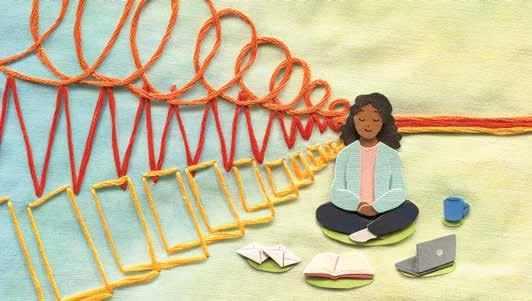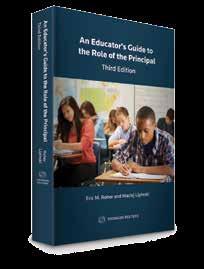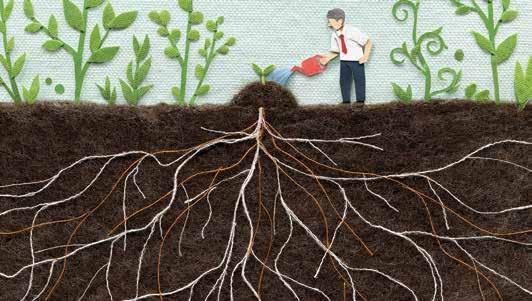A photo of students participating in a youth summit to reimagine the Canadian education system on Mars, as part of the Canada 2067 national initiative. Photo from Let’s Talk Science.
reflections. They are looking for more opportunities to practice sharing their ideas in diverse ways – by speaking, writing, making and prototyping. 8. Self-awareness and direction: STEM education will help students develop self-awareness to build on strengths, improve limitations and move in new directions. They want to connect academic skills, character traits, passions, behaviours, values and aptitudes to the job market. equity AND inclusivity
9. Well-being: Students envision a culture that supports feeling good in your own skin and developing the skills to help others feel good in theirs. They are feeling the weight of stress. They want a school system where the happiness of students, teachers and administrators is paramount. They want to be in a place that is supportive and inspiring, where diversity and inclusion are practiced. Their vision for healthier schools includes healthy and affordable food, frequent breaks for movement and rest and flexible schedules that are more in harmony with the circadian rhythm of teens. 10. Space and comfort: Students want safe, clean, bright and inspiring spaces with more natural light, large flexible spaces that support diverse uses and different types of areas, including labs, maker-spaces, kitchens and libraries. There would be spaces designed to connect socially, places to work in solitude and in collaboration. In addition to cutting-edge technology, students want environmentally responsive and sustainable buildings.
HOW THE CANADA 2067 INITIATIVE IS INFLUENCING CANADIAN EDUCATION While the students imagined learning on Mars, in several provinces across Canada there are new initiatives underway that align with or are also reflective of the Canada 2067 recommendations. Ontario The Halton District School Board (HDSB) has used the Canada 2067 Learning Roadmap as a guiding framework for the development of its new I-STEM program. The areas of focus (e.g., How we learn, What we learn, etc.) anchor the work of the I-STEM Advisory Team, which is composed of diverse stakeholders (staff, parents, post-secondary, industry, community). They are referencing the guiding recommendations as the team builds and reflects on the learning for students and further program development. The 10 key youth insights, coupled with HDSB’s Student Focus Group results, provided student voice to frame the learning experiences for students. As a result, I-STEM learning is more interdisciplinary, issues-based and experiential. Students in I-STEM have opportunities that support invention and innovation to make a difference in the world. Connections with post-secondary education partners, industry and the broader community bring authentic issues-based learning opportunities to the students. The I-STEM Program Overview and Year 1–Engineer’s Toolkit reflect the vision for learning in I-STEM. Nova Scotia Let’s Talk Science, in partnership with the Government of Nova Scotia, is supporting the implementation of the new science curriculum by providing professional development for school administrators that incorporates Canada 2067 recommendations. Saskatchewan In partnership with the Government of Sas-
katchewan, broadcast technology provides job-embedded professional learning for educators and students in a co-learning environment to build skills in computational thinking and coding. BUILDING A FUTURE WITH CANADA 2067 As we look towards the bicentennial year when many of today’s teens will be considering their retirement, it’s clear that we can’t wait 50 years to improve STEM learning! With students at the centre, Canada 2067 offered a powerful platform to engage diverse stakeholders in discussing the future of STEM education. The positive participation and strong alignment across all audiences indicated an understanding that change is needed and that a collaborative approach offers a constructive path forward. Keeping students engaged as active participants in their learning and learning environment will help lead to a collaborative design for the future of education, and a guide to building the resilient problem solvers of tomorrow. Dr. Bonnie Schmidt, CM, FRSC, is the President and Founder of Let’s Talk Science. @LetsTalkScience bschmidt@letstalkscience.ca FURTHER READING
All Canada 2067 reports are hyperlinked below and available in English and French at Canada2067.ca. Additionally, videos from the youth summits and national leadership conferences are also available online. CANADA 2067 LINKS
Canada 2067 Learning Framework – overview (English / French) Canada 2067 Learning Framework – full (English / French) Research Backgrounder – overview (English / French) Research Backgrounder – full (English / French) Youth Insights Book (English / French) Youth Insights overview (English / French) Youth Summit Videos (overview /event pageEnglish / French) Global Shapers Millennial Report (English / French) National Leadership Conference (English / French)
The Register 21









